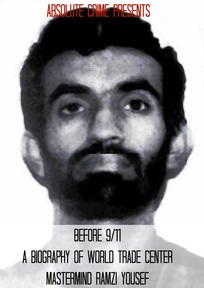Before 9/11: A Biography of World Trade Center Mastermind Ramzi Yousef

He plotted to kill Pope John Paul...to crash a plane into CIA headquarters...to blow 11 airliners flying from Asia to the United States. But it isn't the things that he plotted that he is known for--it's the one that was carried out: the 1993 World Trade Center bombing. Today the attack is largely overshadowed by 9/11, but at the time it was one of the most memorable attacks on American soil.
This book provides insight into Yousef life, his planning of the attacks, and, perhaps, one of the most bizarre twists of fates of any Islamic extremist: how he allegedly became a born again Christian while in prison.
This book provides insight into Yousef life, his planning of the attacks, and, perhaps, one of the most bizarre twists of fates of any Islamic extremist: how he allegedly became a born again Christian while in prison.
Buy Now!
Before 9/11 PDF and ePub |
Excerpt
Introduction: Target…Manhattan
The two towers loomed over Manhattan, dominating the city. Within them tens of thousands of people bustled through their working day. Tourists - nearly ten thousand every hour - swarmed out of the elevators onto the viewing platform to gaze in awe at the Big Apple spread out nearly a quarter of a mile below them. TV and radio antennas mounted high on the great structures fed news and entertainment to millions of New Yorkers. It was just a normal day at the World Trade Center.
It wasn't going to stay normal for long, though. The towers, an awe-inspiring monument to the wealth and power of the free world, had long attracted the hatred of America's enemies. Now a Saudi Arabian millionaire who'd chosen to become a terrorist planned to reach out half way around the world and strike at this symbol of all he hated. From the war-ravaged region along the Afghanistan-Pakistan border, where unbending religious conservatism and pre-medieval tribal law maintain an iron grip on men's minds, a small group of terrorists had travelled to the USA to put a diabolical plan into effect. If all went the way they intended then by the end of the day the towers would be reduced to a mountain of smoldering rubble, the New York skyline would be changed forever and thousands of innocent people would be dead. But this wasn't September 11, 2001. This was February 26, 1993.
The Twin Towers will now always be linked with the image of a Boeing 767, loaded with doomed passengers, being swallowed by the face of the South Tower. Eight years before that, however, al-Qaida had already tried to bring the towers down. They failed, but the violence of the attack was still a shocking blow to the USA. Six people died and more than a thousand were injured; terrorists showed that they could strike at the very heart of a major western city, with weapons potentially capable of causing huge loss of life. After the shock came outrage and a global manhunt for the perpetrators. Most were quickly captured, but the ringleader escaped justice for another two years. In that time he spread a trail of terror around the world, and almost succeeded in causing carnage on a massive scale. His name was Ramzi Yousef and he had links to the highest levels of international jihad. There are many monsters like Ramzi Yousef in the world, and it can be hard to understand where they come from and why they do what they do. Does the life of the WTC bomber provide any answers?
Chapter 1: Early Life
Baluchistan is not a place you'd choose for a vacation. It's the largest of Pakistan's four provinces but the most sparsely populated - it makes up 44% of the country's land area, and only 5% of the population lives there. The climate is harsh and the people are fiercely independent. Nearly 70 years after Pakistan became a nation Baluchistan still isn't fully integrated. Most people survive by subsistence farming and tribal law reigns supreme. The people are a mix of Baluchis, Pashtuns and others, and they have strong links with their fellows across the border in Afghanistan. Many of these links are family ones. Others are not.
Quetta is the largest city in Baluchistan and it's notorious as a center of extremist activity. The ruling body of the Taliban is the Quetta Shura, and it's based in the city. The Haqqani Network, run by former anti-Soviet Mujahid Jalaluddin Haqqani, also has a strong presence there; Quetta and the Waziristan city of Miranshah are both centers of Haqqani's network of religious schools, which churn out a constant stream of brainwashed young insurgents. Pakistani law officially applies in Baluchistan, but what really counts are the strict codes of Sunni Islam and tribal tradition. This is a society where a mullah's word is law, where village courts punish a man by sentencing his daughter to be raped, where human rights take a distant second place to twisted concepts of "respect" and "honor." This is the society Ramzi Yousef's parents came from.
Like many other Baluchis Mohammed Abdul Karim followed the money to the Persian Gulf. Baluchistan lies near the old Silk Road and the people have traded with the Middle East and Far East for millennia. Once they bartered for silk, spices and precious stones. Today tens of thousands work in the oil-rich nations of the Gulf. In Kuwait, Saudi Arabia and the United Arab Emirates the menial jobs are done by Palestinians, Pakistanis and Filipinos, while the locals work for the government or enjoy a playboy lifestyle.
Karim was accompanied to Kuwait by his wife, another Baluchi[1] and the sister of Khalid Sheikh Mohammed. Mohammed, often called KSM by intelligence operators, had become involved in Islamist terrorism by the early 1990s and rose to be a senior figure in al-Qaida. He also spent a lot of time in Kuwait and had frequent contact with his sister. On May 20, 1967 Karim's wife gave birth to a son, whom they named Abdul Basit Mahmoud Abdul Karim. This is the name he grew up with, but he later abandoned it. He's best known under one of the ones he chose - Ramzi Yousef.
Yousef spent his childhood in the suburbs of Kuwait City, attending school with other immigrant children and praying in the local mosque. As a Baluchi he was isolated from the incredible wealth of Kuwaiti society; his family was comfortable, but not rich. However they did have enough money to save up for their children's education, and when they left the Middle East and returned to Pakistan in 1986 they decided to send their son to Britain.
In the fall of 1986 Ramzi Yousef enrolled at Swansea Institute, a technical university in Wales, where he studied electrical engineering. It's not known why he chose this subject. Perhaps his uncle had already influenced him towards a life of radicalism; electrical engineering is a popular subject with terrorist bombers. Whatever his reasons Yousef had an aptitude for the subject, and graduated in 1990 with a Bachelor of Engineering. He had also completed a correspondence course to improve his English, which was now almost fluent.
After graduating Yousef returned to Pakistan. He didn't join his parents in their native Baluchistan, though; instead he travelled to Peshawar, on the notorious North-West Frontier. This area, on the Afghan border, is in the Federally Administered Tribal Areas. The rule of the Islamabad government is even weaker there than it is in Baluchistan, and in the early 1990s it was already a hotbed of Islamist extremism and violence. Peshawar was the headquarters of the Mujahideen who fought the Soviets in Afghanistan, and its links to Pakistan's collapsing neighbor were still strong. Osama bin Laden's Makhtab al Khidamat group had operated from here, and from its remains the more internationally focused al-Qaida was growing. Yousef's uncle, KSM, was a key figure in the new organization and now Yousef wanted to join too. Soon he was in an al-Qaida training camp, adapting his engineering skills to make firing circuits for terrorist bombs. Yousef often claimed to have fought the Soviets as a Mujahid, but like many things he said that was a lie. When the Soviet 40th Army left Kabul for its long march north to the border Yousef was still a student in Swansea. He'd missed his chance to fight the atheist conquerors of Afghanistan. Yousef was determined to fight for his warped view of Islam but his enemy wouldn't be the communists; it would be the west, and most of all the United States of America. Barely a year after graduating he was ready to begin his demented jihad.
[1] Yousef often claims that his mother was a Palestinian. This is false; he simply says it to add a veneer of legitimacy to some of his actions.
The two towers loomed over Manhattan, dominating the city. Within them tens of thousands of people bustled through their working day. Tourists - nearly ten thousand every hour - swarmed out of the elevators onto the viewing platform to gaze in awe at the Big Apple spread out nearly a quarter of a mile below them. TV and radio antennas mounted high on the great structures fed news and entertainment to millions of New Yorkers. It was just a normal day at the World Trade Center.
It wasn't going to stay normal for long, though. The towers, an awe-inspiring monument to the wealth and power of the free world, had long attracted the hatred of America's enemies. Now a Saudi Arabian millionaire who'd chosen to become a terrorist planned to reach out half way around the world and strike at this symbol of all he hated. From the war-ravaged region along the Afghanistan-Pakistan border, where unbending religious conservatism and pre-medieval tribal law maintain an iron grip on men's minds, a small group of terrorists had travelled to the USA to put a diabolical plan into effect. If all went the way they intended then by the end of the day the towers would be reduced to a mountain of smoldering rubble, the New York skyline would be changed forever and thousands of innocent people would be dead. But this wasn't September 11, 2001. This was February 26, 1993.
The Twin Towers will now always be linked with the image of a Boeing 767, loaded with doomed passengers, being swallowed by the face of the South Tower. Eight years before that, however, al-Qaida had already tried to bring the towers down. They failed, but the violence of the attack was still a shocking blow to the USA. Six people died and more than a thousand were injured; terrorists showed that they could strike at the very heart of a major western city, with weapons potentially capable of causing huge loss of life. After the shock came outrage and a global manhunt for the perpetrators. Most were quickly captured, but the ringleader escaped justice for another two years. In that time he spread a trail of terror around the world, and almost succeeded in causing carnage on a massive scale. His name was Ramzi Yousef and he had links to the highest levels of international jihad. There are many monsters like Ramzi Yousef in the world, and it can be hard to understand where they come from and why they do what they do. Does the life of the WTC bomber provide any answers?
Chapter 1: Early Life
Baluchistan is not a place you'd choose for a vacation. It's the largest of Pakistan's four provinces but the most sparsely populated - it makes up 44% of the country's land area, and only 5% of the population lives there. The climate is harsh and the people are fiercely independent. Nearly 70 years after Pakistan became a nation Baluchistan still isn't fully integrated. Most people survive by subsistence farming and tribal law reigns supreme. The people are a mix of Baluchis, Pashtuns and others, and they have strong links with their fellows across the border in Afghanistan. Many of these links are family ones. Others are not.
Quetta is the largest city in Baluchistan and it's notorious as a center of extremist activity. The ruling body of the Taliban is the Quetta Shura, and it's based in the city. The Haqqani Network, run by former anti-Soviet Mujahid Jalaluddin Haqqani, also has a strong presence there; Quetta and the Waziristan city of Miranshah are both centers of Haqqani's network of religious schools, which churn out a constant stream of brainwashed young insurgents. Pakistani law officially applies in Baluchistan, but what really counts are the strict codes of Sunni Islam and tribal tradition. This is a society where a mullah's word is law, where village courts punish a man by sentencing his daughter to be raped, where human rights take a distant second place to twisted concepts of "respect" and "honor." This is the society Ramzi Yousef's parents came from.
Like many other Baluchis Mohammed Abdul Karim followed the money to the Persian Gulf. Baluchistan lies near the old Silk Road and the people have traded with the Middle East and Far East for millennia. Once they bartered for silk, spices and precious stones. Today tens of thousands work in the oil-rich nations of the Gulf. In Kuwait, Saudi Arabia and the United Arab Emirates the menial jobs are done by Palestinians, Pakistanis and Filipinos, while the locals work for the government or enjoy a playboy lifestyle.
Karim was accompanied to Kuwait by his wife, another Baluchi[1] and the sister of Khalid Sheikh Mohammed. Mohammed, often called KSM by intelligence operators, had become involved in Islamist terrorism by the early 1990s and rose to be a senior figure in al-Qaida. He also spent a lot of time in Kuwait and had frequent contact with his sister. On May 20, 1967 Karim's wife gave birth to a son, whom they named Abdul Basit Mahmoud Abdul Karim. This is the name he grew up with, but he later abandoned it. He's best known under one of the ones he chose - Ramzi Yousef.
Yousef spent his childhood in the suburbs of Kuwait City, attending school with other immigrant children and praying in the local mosque. As a Baluchi he was isolated from the incredible wealth of Kuwaiti society; his family was comfortable, but not rich. However they did have enough money to save up for their children's education, and when they left the Middle East and returned to Pakistan in 1986 they decided to send their son to Britain.
In the fall of 1986 Ramzi Yousef enrolled at Swansea Institute, a technical university in Wales, where he studied electrical engineering. It's not known why he chose this subject. Perhaps his uncle had already influenced him towards a life of radicalism; electrical engineering is a popular subject with terrorist bombers. Whatever his reasons Yousef had an aptitude for the subject, and graduated in 1990 with a Bachelor of Engineering. He had also completed a correspondence course to improve his English, which was now almost fluent.
After graduating Yousef returned to Pakistan. He didn't join his parents in their native Baluchistan, though; instead he travelled to Peshawar, on the notorious North-West Frontier. This area, on the Afghan border, is in the Federally Administered Tribal Areas. The rule of the Islamabad government is even weaker there than it is in Baluchistan, and in the early 1990s it was already a hotbed of Islamist extremism and violence. Peshawar was the headquarters of the Mujahideen who fought the Soviets in Afghanistan, and its links to Pakistan's collapsing neighbor were still strong. Osama bin Laden's Makhtab al Khidamat group had operated from here, and from its remains the more internationally focused al-Qaida was growing. Yousef's uncle, KSM, was a key figure in the new organization and now Yousef wanted to join too. Soon he was in an al-Qaida training camp, adapting his engineering skills to make firing circuits for terrorist bombs. Yousef often claimed to have fought the Soviets as a Mujahid, but like many things he said that was a lie. When the Soviet 40th Army left Kabul for its long march north to the border Yousef was still a student in Swansea. He'd missed his chance to fight the atheist conquerors of Afghanistan. Yousef was determined to fight for his warped view of Islam but his enemy wouldn't be the communists; it would be the west, and most of all the United States of America. Barely a year after graduating he was ready to begin his demented jihad.
[1] Yousef often claims that his mother was a Palestinian. This is false; he simply says it to add a veneer of legitimacy to some of his actions.








